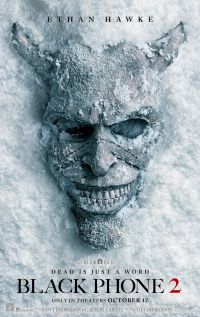
 Tron: Ares Tron: Ares
(Jared Leto, Greta Lee, Evan Peters, Jodie Turner-Smith, Hasan Minhaj, Arturo Castro, Gillian Anderson, Jeff Bridges, et al / PG-13 / 1hr 59mins / Walt Disney Pictures)
Overview: TRON: Ares follows a highly sophisticated Program, Ares, who is sent from the digital world into the real world on a dangerous mission, marking humankind’s first encounter with A.I. beings.
Verdict: Tron: Ares, the third entry in Disney’s now 43-year-old science fiction franchise, finally gets it right. Steve Lisberger’s original, which was a critical and commercial bomb back in the summer of 1982, was more of an experiment than a feature film — not just the first extended attempt to meld live action with computer animation, but the first mainstream stab at imagining the world inside computers, which at the time were just beginning to fully infiltrate our everyday lives.
Three decades later, we got Joseph Kosinski’s Tron: Legacy (2010), which expanded on both the depth and scale of computer-generated imagery, as well as the philosophical conundrums of the original’s immersion of human consciousness into the digital realm. It was a better film in just about every way, but its plot was murky and its dense questions about human-computer interactions, the limits of space and time, and the future of the human condition were ultimately exhausting. The Daft Punk soundtrack was epic, as were the visuals, but it failed, like the original, to fully connect on a human level.
Tron: Ares, on the other hand, finally manages that balance between spectacular visuals and an emotional core that keeps you engaged beyond the visual “wow factor” (it also throws in plenty of nostalgia for the older viewers who remember what “the Grid” looked like circa-1982, who immediately start tapping their feet whenever Depeche Mode’s “Just Can’t Get Enough” plays, and who feel fulfilled just seeing Jeff Bridges on-screen). Ironically, the protagonist of the first Tron movie to feel fully emotionally alive is not a human, but a computer program in human form.
The trick this time, though, is that the computer program has been brought into the “real” world via a lot of elaborate technology involving lasers that can give physical form to anything that can be rendered digitally in a computer. While the first two films allowed humans to penetrate the mysteries of computers by fully inhabiting their space, Tron: Ares asks what would happen if entities created within computer space by humans were to inhabit the human world.
At a time when there is so much deserved hand wringing over artificial intelligence and what it means for the future of humanity, the core concept of Tron: Ares is spectacularly of-the-moment.
The title character, Ares (Jared Leto), is a Master Control Program created by Julian Dillinger, the grandson of Edward Dillinger, the villain of the first Tron. While both his father and grandfather worked for ENCOM, the computer company created by the series’ hero Kevin Flynn (Bridges), Julian has broken off and formed his own rival company and is set on landing massive military contracts by using computer technology to create military hardware, weapons, and soldiers.
Ares, his ultimate creation, is presented to stakeholders and military brass as “the ultimate soldier”—“biblically strong, lightning fast, and supremely intelligent,” but also entirely expendable because, if struck down, he can simply and quickly be recreated. The first question, of course, is how Julian can assure control over Ares, which he asserts he can, although that hardly turns out to be the case. As the plot unfolds, it becomes clear that the central theme of Tron: Ares is the uncontrollable nature of our digital creations.
Ares, despite being programmed to obey, does quite the opposite, and in the process becomes the most intriguingly “human” character in the entire series. Leto plays him in impressively subdued fashion, conveying with minimal expression an ever-changing worldview that takes him from expendable automaton to fully realized agent.
Ares’s ability to become fully part of the external human world relies on his tracking down the so-called “permanence code,” which is what allows him and everything else brought out of the computer into the real world to last more than 29 minutes. To do his, he teams with Eve Kim (Greta Lee), the current CEO of ENCOM who is still mourning the loss of her sister, with whom she had been running the company.
Although he and another program-soldier named Athena (Jodie Turner-Smith) were originally instructed by Jullian to kill Eve, Ares becomes more and more self-conscious and eventually rejects his programming, recognizing the inherent immorality of Julian’s orders (it is like an old-fashioned political conscience raising).
Julian, who is all bravado and greed — an insufferable, tattooed “tech bro” par excellence — is positioned as the antithesis of Eve, who wants to use technology to improve the human condition and make the world a better place, rather than just make money and amass power; their conflict is physical in terms of the film’s action, but it also suggests a larger conflict of worldviews involving technology as an instrument of either domination or liberation.
Ares’s being drawn to Eve is indicative of his emerging conscience, which stands in stark contrast to news stories you have likely read about AI encouraging people to commit suicide and fantasizing about the downfall of Western civilization. If you want a movie with an optimistic view of what the late-stage Computer Era might bring us, Tron: Ares is it.
Of course, with progress comes much violence and destruction, and if you don’t want to think too deeply, Tron: Ares provides plenty of hyperkinetic action, much of which was filmed IMAX-friendly for maximum visceral impact. While all the action—the hand-to-hand combat, Light Cycle races, and so forth — took place in the digital world in the first two films, now it all takes place in the familiar environs of our world.
Evoking its own unique visual patina, Tron: Ares revels in a color palette that mixes the black of night with the red of blood. Director Joachim Rønning, who previously helmed the Disney productions Maleficent: Mistress of Evil (2019) and The Young Woman and the Sea (2024), stages roaring action sequences for maximum impact, giving the film a distinctly grittier tone that is maximized by the thundering industrial-electronic soundtrack by Nine Inch Nails.
The vehicles we had previously seen only in the digital realm come full-force into ours, splitting police cars in two, causing pile-ups in downtown San Francisco, and smashing through skyscrapers. Such visual mayhem is nothing new in the modern action film, especially with so many superhero films that are overly reliant on mass destruction as both visual spectacle and thematic signifier, but Rønning gives it a sense of personality and real danger, which allows the film to transcend action-movie cliches and come much closer to a sublime sense of worlds truly colliding. [J.K.]
|
 Frankenstein (2025) Frankenstein (2025)
(Oscar Isaac, Jacob Elordi, Mia Goth, Christoph Waltz, et al / R / 2hr 29mins / Netflix)
Overview: Oscar-winning director Guillermo del Toro adapts Mary Shelley’s classic tale of Victor Frankenstein, a brilliant but egotistical scientist who brings a creature to life in a monstrous experiment that ultimately leads to the undoing of both the creator and his tragic creation.
Verdict: When Mary Shelley published Frankenstein in 1818, she did not have a safety net. As genres, horror and science fiction were in their infancy—she couldn’t draw from any tropes, traditions, or cliches. Instead, she relied more on tragedy and melodrama, creating a horror story that has more depth than the classic 1931 Universal film from James Whale.
Guillermo del Toro’s new Frankenstein adaptation is also like that. It’s not scary in any modern sense, but in the ways in which its characters are trapped within their natures. Unlike Kenneth Branagh’s 1994 version, which was faithful to a fault, del Toro has the wherewithal to have the look of the film match its subject matter.
In high Gothic style, the story of the mad scientist and his hideous creation has never been more visually sumptuous. With terrific performances to boot, del Toro’s long-awaited film is the definitive movie version of the classic novel.
When we meet Victor Frankenstein (Oscar Isaac), he’s on the verge of death. Rescued from the ice in the Arctic, the crew of a shipping vessel nurses him back to health. Most of the story is told in flashback, with Victor explaining how he ended up in the frozen ocean.
In del Toro’s version, Victor’s desire to create life began early when his father (Charles Dance), a stern physician, could not save his mother from the perils of childbirth. These scenes are shot in an elegant English mansion, with all the signifiers of obscene wealth that no doubt influenced Victor’s monstrous ego.
As a brilliant doctor, Victor is consumed by the idea of creating life, which alienates him from his contemporaries. Still, he catches the attention of the wealthy arms dealer Henrich Harlander (Christoph Waltz), who decides to be Victor’s benefactor.
Now with limitless resources, Victor heads to an abandoned mansion in the Scottish Highlands to create a new man from spare parts. But the Creature he creates (Jacob Elordi) disgusts him so much that Victor tries to burn him alive. As most of us know, the Creature escapes, develops intelligence, and wants an explanation—or maybe revenge—from his creator.
Like del Toro’s earlier films, his knack for production design has no rival. This Frankenstein looks terrific, an architectural wonder full of bold colors. Victor’s lab, for example, is full of deep greens, bizarre symmetry, and giant windows. No one would ever build a lab that looks this way, which is part of del Toro’s larger point.
His Frankenstein exists in a heightened world, one where exaggeration is an extension of Victor’s mania. Later, when the Creature learns about humanity from a blind man (David Bradley), the setting is homey and traditional, a reflection of the dependable values and decency that the man bestows. Along with cinematographer Dan Laustsen, del Toro brings each set to life, almost literally, and not unlike what Victor does with the Creature. All the visual choices, right down to the costumes and edits, are also a kind of metaphor.
The rich production values and special effects leave no room for timid acting. Isaac has played a mad scientist before in Alex Garland’s Ex Machina, but instead of a manipulative tech bro, his Victor is a foppish know-it-all who harbors the delusion that he is beyond morality. When he meets his brother’s fiancée Elizabeth (Mia Goth), he attempts to seduce her almost immediately because, to him, no genius should be denied anything he wants.
Isaac does not excuse Victor’s conduct, instead he leans in to it so he becomes the closest thing the movie has to a villain. Whereas Isaac is full of aristocratic mannerisms, the monster’s movements are almost feral. At 6-foot-5, Elordi is a tall actor; at first he moves like an animal, his sinewy body bending so we cannot quite sense his strength. It is not until later, when the Creature seeks out his creator, that Elordi moves with confidence and inhuman power. Elordi gives a fascinating physical performance, and his dialogue is spoken deliberately, with a tragic sense of irony.
Shelley’s story has always posed the larger question: If the creature was cast aside so thoughtlessly by his creator, what does that say about our relationship to God? Notions of religion, guilt, and responsibility are pervasive throughout every Frankenstein, just never with this depth. A typical horror film would explore these themes with violence and gore, but del Toro takes a more cerebral approach, giving his characters mature dialogue, an opportunity to reflect on their mistakes, and become better people before it is too late.
But cerebral doesn’t mean there isn’t any thrilling action, like when the indomitable Creature fights off his attackers, both man and beast. These scenes offer del Toro a way to depict the Creature’s profound alienation.
Throughout his career, del Toro has made films about misunderstood monsters who yearn for acceptance while living on society’s fringe and many have played with elements of Shelley’s novel. In that sense his Frankenstein is the thrilling apotheosis of ideas he has pursued for decades. To borrow a phrase from another monster movie, it’s alive! [A.Z.]
|
 Bugonia Bugonia
(Emma Stone, Jesse Plemons, Aidan Delbis, Stavros Halkias, Alicia Silverstone, et al / R / 1hr 58mins / Focus Features)
Overview: Two conspiracy obsessed young men kidnap the high-powered CEO of a major company, convinced that she is an alien intent on destroying planet Earth.
Verdict: The prominent Greek filmmaker Yorgos Lanthimos known for making memorable films like The Favourite, The Lobster, Kinds of Kindness, and Poor Things among others, has reunited with Emma Stone for the fourth time with Bugonia.
While the intriguing trailer created curiosity among the cinegoers, let’s find out whether it impresses the audience or not…
The plot of the movie starts with Michelle Fuller (Emma Stone), the successful and cunning CEO of Auxolith, who showcases herself as a person who wants to make world a better place, gets abducted by Teddy Gatz (Jesse Plemons) and his neurodivergent cousin Don (Aidan Delbis).
Teddy, a conspiracy theorist thinks Michelle is not a human being but a part of an invasive alien species, the ‘Andromedans’, who are impacting the human race. That is all you really need to know ... well, save for the fact that this is going to be in the Oscar hunt for sure next year. [G.A.]
|
 Black Phone 2 Black Phone 2
(Mason Thames, Madeleine McGraw, Jeremy Davies, Miguel Mora, Demián Bichir, Ethan Hawke, et al / R / 1hr 48mins / Universal Pictures)
Overview: Four years ago, 13-year-old Finn killed his abductor and escaped, becoming the sole survivor of The Grabber. But true evil transcends death ... and the phone is ringing again.
Four-time Academy Award® nominee Ethan Hawke returns to the most sinister role of his career as The Grabber seeks vengeance on Finn (Mason Thames) from beyond the grave by menacing Finn’s younger sister, Gwen (Madeleine McGraw).
As Finn, now 17, struggles with life after his captivity, the headstrong 15-year-old Gwen begins receiving calls in her dreams from the black phone and seeing disturbing visions of three boys being stalked at a winter camp known as Alpine Lake.
Determined to solve the mystery and end the torment for both her and her brother, Gwen persuades Finn to visit the camp during a winter storm. There, she uncovers a shattering intersection between The Grabber and her own family’s history.
Together, she and Finn must confront a killer who has grown more powerful in death and more significant to them than either could imagine.
Verdict: Over three years since the release of The Black Phone film adaptation, a sequel has finally made its way into theaters this month. Huge off-screen narrative developments have occurred in the few years between the 2021 film and its feature film follow-up, briefly in the spin-off segment of Shudder’s V/H/S/85, titled “Dreamkill”, but more so in this current entry.
On the one hand, Black Phone 2 features uneasy adult figures with particularly rough backgrounds, including the serial kidnapper/ killer known as “The Grabber” (Ethan Hawke). This antagonist has recently stirred controversy within the public sphere for preying on young boys, albeit not in the same manner as Freddy Krueger’s egregiously exaggerated conception.
On the other hand, the younger characters have matured, now living life as teenagers in high school. The Blake siblings—Finney “Finn” (Mason Thames) and Gwendolyn “Gwen” (Madeleine McGraw)—are getting along with their father, Terrence (Jeremy Davies). Yet, they still suffer from certain lingering traumas of their shared past.
Black Phone 2 allows viewers to ride shotgun in the franchise’s second chapter, especially as an improvement of its predecessor. To an extent, it impresses as a young adult novel story akin to Harry Potter or Percy Jackson. Narratively and thematically, this works brilliantly and has much to say about the world that it establishes.
I also love the subtle message that all things change with time. The phones present in the film are crucial signs of Derrickson and Cargill transferring viewers from the late 1970s and into the ’80s. We aren’t just living in an era of rotary phones, but are now introduced to payphones and phone booths. The then-new decade calls forth an evolution in lifestyle and culture. For a subgenre film, it predates the epoché centered on Scream and what Wes Craven’s franchise opened the doors to. [J.D.T.]
|
 Springsteen: Deliver Me from Nowhere Springsteen: Deliver Me from Nowhere
(Jeremy Allen White, Jeremy Strong, Paul Walter Hauser, Stephen Graham, Odessa Young, et al / PG-13 / 2hr 00mins / 20th Century Studios)
Overview: From 20th Century Studios, Deliver Me from Nowhere chronicles the making of Bruce Springsteen’s 1982 Nebraska album. Recorded on a 4-track recorder in Springsteen’s New Jersey bedroom, the album marked a pivotal time in his life and is considered one of his most enduring works - a raw, haunted acoustic record populated by lost souls searching for a reason to believe.
Verdict: There isn’t a musical artist that deserves a biopic more than Bruce Springsteen, and how long this took to get (part of) his story to screen honestly feels criminal. It might have taken the commercial and Oscar-nominated success of James Mangold’s A Complete Unknown to move the needle, since Scott Cooper’s Springsteen: Deliver Me from Nowhere is completely uninterested in the most “commercial” aspects of the singer’s life.
His biggest hits and the skyrocketing adulation he experienced at a very early age are rarely mentioned here. In fact, the movie, based on Warren Zanes’ book of the same name, features only one concert performance (“Born to Run”), with the rest focusing on his most intimate and troubled time as an artist on a journey of self-discovery.
That “self-discovery” led to the release of his seminal masterpiece, “Nebraska,” which is highly regarded as one of the singer’s best albums, and has since been reappraised as one of the greatest folk albums in the history of popular music. It was a massive departure at the time from the commercial-sounding sounds he’s captured, because, we learn, the singer (played here by Jeremy Allen White) had been struggling with depression and reckoned with his past as a child, under the hands of his abusive, alcoholic father (played by Stephen Graham).
These flashback sequences, deftly shot in black-and-white by cinematographer Masanobu Takayanagi (in his fifth collaboration with Cooper), should, in theory, bring us closer to the artist in ways we’ve never experienced before, but do the exact opposite. In fact, Cooper’s screenplay is the worst of his career.
It’s one filled with painfully inert dialogues that never seriously treat difficult subjects like depression, alcoholism, mental health, and abuse, and instead cartoonishly depicts Springsteen’s childhood – and, by extension, his isolation in Colts Neck – as a “checkbox” to fill rather than a psychologically active portrait of the artist’s most complex period.
“Nebraska” was a watershed moment for Springsteen, both in his professional and personal life. There was intense debate amongst record producers Jon Landau (Jeremy Strong) and Al Teller (David Krumholtz) on whether or not this album would help (or worsen) his career, as he needs to capitalize on the recent success of “Hungry Heart,” not do the opposite of what is expected from him and formally experiment in ways he never did before.
Why was there such massive opposition for the artist to do what he wanted at a period when he could surprise his most ardent fans? And most importantly, why was it essential for Bruce to suddenly stop the crazy ride, we learn, he has been on for several years to embark on the tormented process of writing his most personal – and complex – album, secluded from everyone else, with only one recording engineer (played by Paul Walter Hauser) at his side?
These questions should theoretically be at the heart of Cooper’s project, an examination of the artist at his most vulnerable. Unfortunately, the Crazy Heart filmmaker refuses to make them the core of the project. It would rather present this “watershed moment” as a quasi-Wikipedia bio, where we only get the surface of what happened (Springsteen watching Terrence Malick’s Badlands and being inspired to write a song on the Starkweather murders, or seeing a mansion on a hill, and writing the lyrics “Mansion on the hill”) instead of deepening it further than the text on the encyclopedia states it verbatim.
Cooper desperately tries to fill in the gaps with those aforementioned black-and-white flashbacks, and while they are stunningly shot and look phenomenal on an IMAX screen (thanks in no small part to Takayanagi being one of the best directors of photography working today), they add almost zero texture to the whole package.
We instead spend most of its tedious 120-minute runtime in endless platitudes where a depressed Springsteen writes words on a page, records songs, writes words on a page, records songs, stares at an empty wall, wondering what’s going on, writes words on a page, records songs, argues with Jon Landau and producer Chuck Plotkin (Marc Maron) on the sounds of the Nebraska album, gets further depressed, writes words on a page, and so on.
There’s no interiority or deeper examination of the why behind this creative process. Cooper seems utterly uninterested in this and instead populates this dull biopic with as many references to his most popular songs (Paul Schrader’s Born in the U.S.A. screenplay as a basis for his next album) as he does to helping us understand what this album means for Bruce at his most personal level.
Of course, fans of The Boss may enjoy a jam session where Jeremy Allen White lip-syncs “Born in the U.S.A.” (Bohemian Rhapsody? Anyone?), but beyond those fan-servicey sequences that serve to jingle keys everyone’s faces, what does this movie have to offer? “Nebraska” is such an incredible album, which still teaches its audience something to hold onto over forty years after its release. Reducing it to its most boring aspects is a feat in and of itself because the record’s complexities are still analyzed to this day.
Sadly, the audience never gets anything of note from White’s Springsteen that makes them aware of the significance of keeping the sounds of the recording sessions intact or maintaining the album’s stripped-back musical patterns for the album’s release. There’s no examination; only pointing out things that happened, with little context or development.
Whether or not you liked A Complete Unknown, you should give Mangold (and screenwriter Jay Cocks) credit that the movie does peer into Bob Dylan’s tormented psyche, as folk music was on the cusp of a watershed moment if he decides to “go electric.” Traditionalists (like Pete Seeger) vehemently opposed this shift, but for music to evolve in the direction it eventually went, Dylan had to go electric when he did.
It’s a repetitive, but intimate portrait of the artist’s most important contribution to the advancement of folk music. In contrast, there’s no urgency to the opposition we see in Deliver Me from Nowhere. There’s no urgency because none of us feels what Springsteen experiences deep inside his mind, regardless of the fairly solid performance Allen White delivers on the exterior as The Boss, with no desire to deepen what’s on the page.
Strong is sadly (once again) miscast as Landau, in a role that never examines what he means to Bruce, and who Bruce is as a human being. We never get a sense that these are best friends who are always there for one another, because the inner conflict the singer experiences seems frivolous to Cooper, who never captures it with the intimacy needed to make a movie like this feel genuinely moving.
He instead distills the most challenging period of Springsteen’s life into a lethargic and repetitive bore, whose screenplay is so painfully lifeless that it eventually leads to a Walk Hard: The Dewey Cox story conclusion, where Springsteen explains that he never sat on his dad’s lap and that, through a final text, “he continued to struggle with depression, but never again without help or hope.”
With this text acting like a massive wet fart, this lifelong fan of Bruce Springsteen felt personally insulted that his life – and most tormented creative endeavor – would be represented in such a facile, unengaging, and painfully dull way, with no interest in wanting to explore who Springsteen is behind the façade he adopts in public.
The Boss deserves so much better than Springsteen: Deliver Me from Nowhere. So much better. Here’s hoping an eventual “second take” on his life will do it more justice than Cooper’s navel-gazing excuse of a “biopic.” [M.V.]
|
 Predator: Badlands Predator: Badlands
(Elle Fanning, Dimitrius Schuster-Koloamatangi, et al / PG-13 / 1hr 55mins / 20th Century Studios)
Overview: Predator: Badlands, which stars Elle Fanning and Dimitrius Schuster-Koloamatangi, is set in the future on a remote planet, where a young Predator (Schuster-Koloamatangi), outcast from his clan, finds an unlikely ally in Thia (Fanning) and embarks on a treacherous journey in search of the ultimate adversary.
Verdict: After years of diminishing returns and sequels that failed to garner real excitement, the Predator franchise got a massive shot in the arm in 2022 with the release of Prey. The 1700s-set, Comanche-centric thriller breathed new life into the property, with stylish visuals, a compelling story, and a fantastic lead performance from Amber Midthunder.
And while the film earned rave reviews, it was hindered from the start by a streaming-exclusive release model that kept it from theatrical greatness. This year’s Predator: Killer of Killers, an animated anthology film also helmed by Prey director Dan Trachtenberg, earned a similarly strong reception but was once again relegated to Hulu.
Now, three years after Prey, Trachtenberg is trying to catch lightning in a bottle again, this time on the big screen. Predator: Badlands is very different in premise from Prey, set in the far future on a distant alien planet, and with a young Yautja, aka Predator, named Dek (Dimitrius Schuster-Koloamatangi), as the protagonist rather than the villain.
Indeed, Badlands is also rated PG-13, a first for the Predator franchise (not counting Alien vs. Predator). All of those changes have led some to question whether or not the film will find the same success.
Although some of the better middle-era Predator entries, like 2010’s Predators, made lore contributions or small tweaks to the formula, they didn’t take the bold steps that Prey did. Predator: Badlands seems to be going even further in reinventing the franchise, all while holding onto the core pillars that have always held it up — visceral action, compelling visuals, and a blend of genres that yields a unique whole.
|
...Archives
|
|

